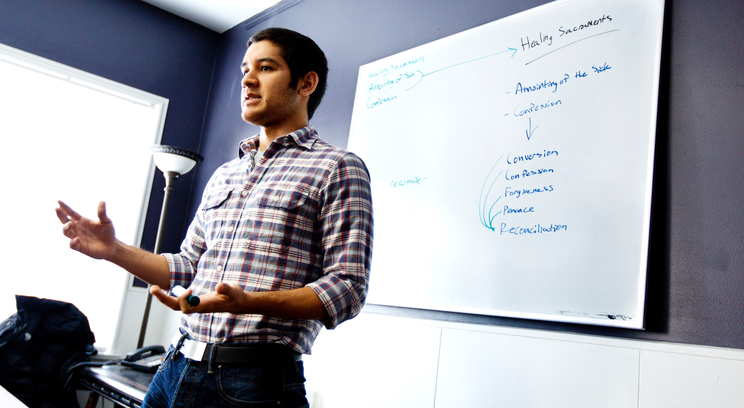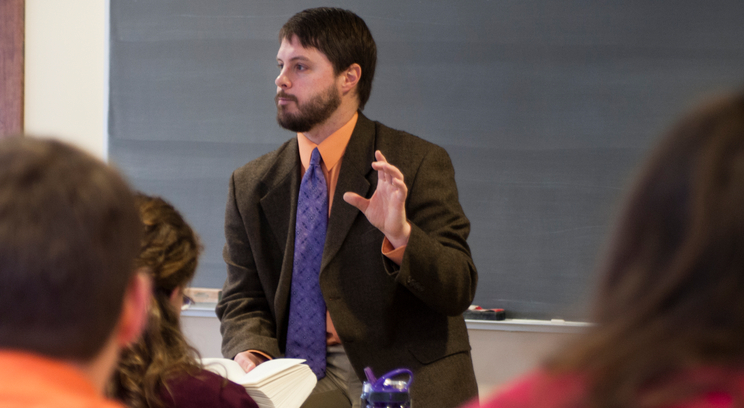The Center for Catholic Studies is forging a new partnership with Caritas in Veritate International, a confederation of Catholic charitable institutions dedicated to recruiting, forming, mobilizing and engaging young volunteers in the spirit of Pope Benedict’s encyclical Deus Caritas Est. It has become ever clearer that an essential aspect of the New Evangelization is the witness of Christians who care for those most in need. At the same time, Catholic charity organizations do their work best when they are animated by fullness of the Gospel witness. Evangelization and service to the poor are not two different things, they are two aspects of the same thing: the task and privilege of presenting the face of Christ to a world so much in need of Him.
The Center will work with Caritas in Veritate, especially through the Habiger Institute for Catholic Leadership and the John A. Ryan Institute for Catholic Social Thought, to establish a training program for workers in charitable organizations focusing on integral human development: what it means to bring the Gospel in its manifold forms to those in need. Our first seminar will take place on UST’s campus in June 2013. We are excited about this promising opportunity and look forward to seeing how this partnership develops.
The Leadership Intern Program equips and trains future Catholic leaders through seminars, hands-on leadership experience, interaction with civic and Church leaders, and intensive formation. The year-long program recruits promising students from many different fields of study who demonstrate capacity for leadership. In addition to forming a cooperative understanding of leadership across groups and personalities, we give our Interns vision and training in a Catholic understanding of leadership that will serve them both in their immediate responsibilities and in the tasks and roles they take up after graduation. Program activities include an initial Vision Retreat, a semester-long Leadership Seminar, regular formation meetings, service opportunities, dialogue and interaction with invited speakers, coordination of various student life programs, and an off-site 10-day Spring Institute.
The Latino Leadership Program recruits and forms a new generation of Latino students in order to develop their potential for service and ministry within their communities. It is necessary to prepare new leaders in the Latino community, who are able to draw upon their own deep cultural roots within the Catholic faith, in order to provide leadership on the problems and opportunities that their growing faith communities confront. In addition to the formative small group community gatherings and demonstration of leadership skills, the program also involves a service component to the local Hispanic community; the students teach in the Confirmation program at St. Stephen’s Catholic Church.
The Catholic Studies Community Living: Men’s and Women’s Households involve Catholic men and women live together around an ideal of Catholic life and study. The two on-campus women’s houses and the one off-campus men’s house each have a simple rule of life, a chaplain, and regular events, including Masses together, meals, nights of formation, invited speakers, evangelistic gatherings and good fun.
The Professional Leadership Formation program pairs undergraduate students with Catholic mentors in the local professional community. An important part of the Church’s social mission is the witness of people of action who demonstrate the Gospel through their lives and character. By introducing students to Catholic professionals who are witnessing to their faith at work, we offer students a unique integration of faith and work that will help to launch their professional vocations.
The Catholic Studies Scholars Program is designed to identify unusually talented undergraduates in their sophomore years and to provide a two-year intensive formation in the Catholic intellectual tradition in preparation for a university faculty position in a specific academic or professional discipline. The program involves ongoing relations with faculty mentors who will assist the students in clarifying academic interests and identifying specific graduate programs that might develop those interests fully.







